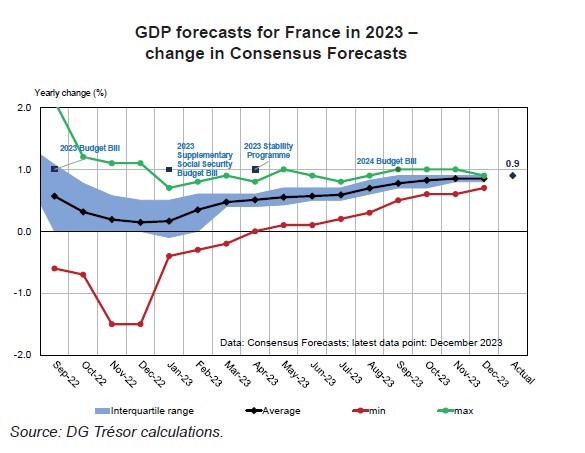Review of the French Government’s Economic Forecasts for 2023 and 2024
Despite major uncertainty in summer 2022, when the 2023 Budget Bill was being drafted, the French Treasury forecast GDP growth of 1.0%, almost matching the final estimate from INSEE (0.9%). The scenario’s key assumptions, in particular an uninterrupted energy supply and an upturn in aircraft manufacturing and electricity generation, were confirmed. The 2024 Budget Bill forecast for GDP growth for the year had been 1.4%, but was then revised to 1.1% for the 2025 Budget Bill of October 2024.
The macroeconomic scenario of the 2023 Budget Bill, presented in September 2022, was drawn up amid great uncertainty. The repercussions of the Russian offensive in Ukraine on energy supply in particular, and the impact of monetary tightening in response to soaring inflation were major unknowns when calculating forecasts.
Despite this uncertainty, 2023 GDP growth (0.9% based on annual INSEE accounts published in May 2024) nearly matched the 2023 Budget Bill forecast (1.0%). The Consensus Forecasts, which estimated growth of 0.6% in September 2022 and which had hit a low point of 0.1% in December 2022, gradually converged with the French government forecast.
The main economic forecast assumptions were confirmed: winter 2022/2023 saw no energy supply shortages, and the French economy benefited from a catch-up effect, particularly in aircraft manufacturing and electricity generation. Growth drivers on the other hand were more balanced than envisaged in the Budget Bill: growth was sustained to a greater degree by foreign trade and to a lesser extent by consumption, with the savings rate remaining high. While business investment proved more resilient than expected, household investment fell further.
The 2023 Budget Bill forecast predicted a peak in inflation in early 2023, followed by a gradual decrease. This forecast was correct, with inflation reaching its peak in February 2023 and declining for the rest of the year, due to a drop in energy prices and then in food prices. Overall inflation for the year was however higher (4.9%) than the 2023 Budget Bill forecast (4.2%), which itself was higher than the Consensus Forecasts (3.6%).
The macroeconomic scenario underlying the 2024 Budget Bill, which was submitted in September 2023, forecast a pickup in growth in 2024 (1.4%). This growth forecast was reviewed downwards in February 2024: the adjusted economic scenario was set out in the 2024-2027 Stability Programme published in April 2024. This forecast for 2024 was adjusted upwards to 1.1% in the 2025 Budget Bill submitted in October 2024. The adjustment to the initial forecast was made primarily because of a less buoyant international environment and more sluggish consumption, despite faster disinflation than expected.
